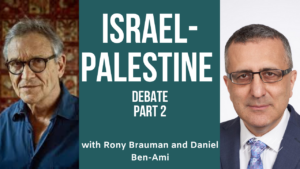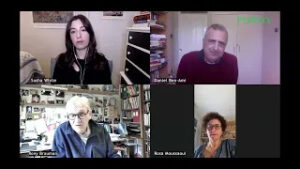
Image license: CC0 Public Domain
It would be far better if opponents and supporters of Israel engaged in open debate rather than trying to cancel each other –Daniel Ben-Ami
Back in November there was a rowdy protest outside an event organised by the London School of Economics (LSE) Debating Society where Tzipi Hotovely, Israel’s ambassador to Britain, was speaking. Although the meeting went ahead as planned she had to be rushed away by security afterwards as there were credible threats of violence against her. Hotovely had defied attempts by anti-Israel activists to deplatform her simply through the act of speaking at the university.
The event is worth exploring in more detail because it is a good illustration of the gross intolerance of anti-Israel activism and the anti-Semitism that often attends it. It also hints at the sometimes problematic reaction against such bigotry from Israel’s supporters and from opponents of anti-Semitism. Indeed the response too often itself poses a threat to freedom of speech. Although this example comes from London there here have been similar instances in other parts of Britain, continental Europe and North America.
A good place to start examining the LSE case is its Student Union Palestine Society’s Instagram account. In a post on the event the society stated that: “Tzipi Hotovely who has a track record of anti-Palestinian racism, islamophobia [sic] and war crimes, as well as actively facilitating apartheid and settler-colonial occupation as the Israeli Settlements Minister. It is our duty to protest this event and make it known that such violent racist rhetoric, denial of Palestinian existence and colonial apologism has no place in our LSE campus and is not up for “debate”.”
This post is problematic in several ways but the most egregious clause is probably the last one including the inverted commas around “debate”. The clear implication is that there is no scope for genuine dialogue on any of the contentious claims made in the post. In a blatant violation of the ideal of academic freedom it is suggested that pro-Israeli ideas should be banished from campus.
The idea of “violent racist rhetoric” is also dubious. It takes the dangerous step of collapsing the distinction between words and physical violence. Yet the need to draw a clear line between the two is essential in a free society. One reason for encouraging freedom of speech is precisely that it acts as an alternative to resolving conflict through fighting.
Of course it would be fine if the LSE activists simply wanted to protest against Hotovely’s speech rather than trying to banish her from the university. It would be even better if they tried to defeat her arguments in open debate. No doubt they would not sway the ambassador herself but, if they were articulate enough, they might convince others on their criticisms of Israel.
It is also true that Hotovely, a former member of the Israeli parliament, is on the hard religious right of Israeli politics. For example, she opposes marriage between Jews and non-Jews (which in the Israeli context generally means Arabs). But however questionable such views are she should be free to express them. Her opponents are then of course free to challenge and indeed ridicule her.
Unfortunately the anti-Israel protest at LSE was not exceptional. It was entirely in line with anti-Israel activism and what has become known as the BDS (Boycott, Disinvestment and Sanctions) movement. BDS, for example, calls for the creation of what it calls “Apartheid Free Zones” (since it defines Israel as an “apartheid state”). In practice this can only mean banning the expression of pro-Israel views in the designated areas. It does claim its academic boycott is of “complicit Israeli institutions” rather than individuals but in practice this tends to mean boycotting all those except Israelis who share BDS’s views.
Given the blatant intolerance of anti-Israel activism it might seem that the obvious counter would be to take the moral high ground. It would in principle be straightforward for the opponents of anti-Israel activism to put their own arguments without arguing that BDS should be muzzled. Unfortunately such a reaction is rare.
To be fair pro-Israel or Jewish community organizations seldom call for organizations such as BDS to be banned outright. Usually they make the entirely reasonable demand that anti-Israel protests should be peaceful. The problem is that they tend to draw any conception of incitement to violence so broadly that it inevitably becomes an attack on free speech.
Take the LSE protest as an example. The Campaign Against Anti-Semitism (CAA), a Jewish community organization, condemned the protestors for chanting “from the river to the sea, Palestine will be free” (meaning from Israel’s Mediterranean coast to the River Jordan). The organization pointed out correctly that the chant could be seen as a breach of the International Holocaust Remembrance Alliance (IHRA) definition of anti-Semitism. This includes the stipulation that denying Israel’s right to exist is itself a form of anti-Semitism.
There are several problems with the CAA’s take on this. Although for Islamists the implication of this chant is clear this is unlikely to be the case for 18 or 19-year-old university students. Its widely held meaning is not immediately apparent to those with no or little knowledge of the conflict. Banning its use is counterproductive in that it makes it harder to explain and challenge the ideas implicit in it.
In addition, however pernicious the chant may be, activists should be free to use it. If political chants are restricted to those that those in the mainstream regard as reasonable there is no free speech. Free expression must include the right to express ideas that others regard as hateful including support for the destruction of the state of Israel.
Indeed the whole idea of hate speech is dangerous since it blurs the key distinction between words and violence. The freedom to express ideas that others regard as vile is fundamental to a free society. That is entirely different from actual violence or even explicit threats of violence.
Finally, it should be noted that the IHRA definition, introduced in 2016, is increasingly being used to curb discussion on Israel and on anti-Semitism. Although it is styled as a non-legally binding working definition many institutions, including governments and universities, are under pressure to adopt it. If they do not they face the possibility of being branded as anti-Semitic.
This is an entirely technocratic and authoritarian conception of tackling anti-Semitism. As it happens it is a fool’s errand to assume that a phenomenon as complex as anti-Semitism can be captured in such a definition. The imposition of rules that designate particular views as illegitimate is also a violation of free expression. It is another example of trying to suppress bad ideas through bureaucratic means rather than challenging them in open debate.
It is hard to think of an area of political debate more emotionally charged than that of Israel and its relationship with the Palestinians. But it would be a step forward if there was free speech on the subject. That would open the possibility for misconceptions to be challenged rather than letting grievances fester.
The present situation is the worst of all possible worlds. Both Israel’s supporters and its opponents too often attempt to cancel each other. There is no possibility of rational debate until this cycle is broken.
—
Daniel Ben-Ami runs the Radicalism of fools website on rethinking anti-Semitism. He tweets at @danielbenami



